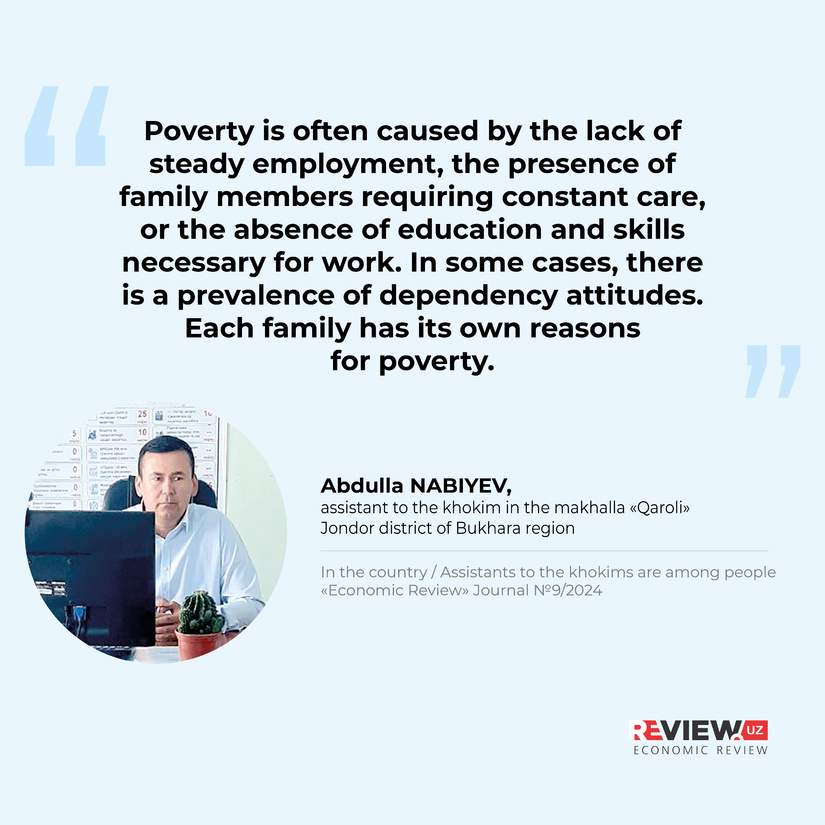– The institution of khokim’s assistants has become one of the key components of socio-economic reforms in the country. How do you understand the purpose of this role?
– In 2022, at the President’s initiative, the country introduced the “mahallabay” system and established the position of “khokim’s assistant.” The main objective of this role is to thoroughly understand the living conditions, interests, economic situation, and lifestyle of each household in the mahalla. Our goal is to help them start entrepreneurial activities and assist in solving any arising problems. This role involves not only providing loans but also offering comprehensive support to help people in difficult situations improve their lives. In this context, it’s also essential for us to collaborate with leading entrepreneurs within the mahalla, for example, by helping those in need find employment with local businesses or establishing mutual partnerships. This creates a win-win situation for everyone involved.
– Could you briefly describe your professional background and how you came to this position? What did you do before, and which skills have helped you effectively fulfill your responsibilities?
– I was born and raised here. I graduated from the Economics Faculty at Bukhara State University and also studied finance at the Academy of Banking and Finance. Before transitioning to the role of khokim’s assistant, I served as the deputy manager at the Jondor district branch of Agrobank in the Bukhara region. Working in the banking sector, I dealt extensively with both businesspeople and ordinary citizens and became well acquainted with their challenges. This experience has proven invaluable in my current role.
– Could you describe the location of your mahalla, employment opportunities for residents, and what is known about the social composition and welfare of the population?
– The mahalla is located 15 kilometers from the district center and is considered a mid-level neighborhood. The “Qaroli” mahalla has 1,795 houses, with a population of 7,126 residents. Most of the population works at enterprises and public organizations in the district. By 2022, there were only 80 business entities in the mahalla. As a result of the “honadonbay” system research, preferential loans and subsidies were provided to residents interested in entrepreneurship.
– According to survey data, what were the main drivers of development in the mahalla, and what were the priority tasks? What did you achieve in your first year in this role in terms of improving living conditions and well-being for the residents?
– The primary driver of development in the mahalla is entrepreneurship, with part of the population also engaged in seasonal work. Initially, the focus was on categorizing the population, identifying families in need of social protection. Now, the emphasis is on comprehensive entrepreneurship development through individual programs to improve the welfare of residents. This approach helps provide employment for the unemployed and grants preferential loans and subsidies based on residents' preferences.
– Could you tell us what has been accomplished in your mahalla in 2023?
– Together with residents, we planned to pave the internal roads and submitted this initiative in the second season of the "Participatory Budget" project for 2023. As a result, we secured 1.3 billion sums to pave 2.9 km of internal roads in the neighborhood. Under the “Yashil Makon” program, residents and sponsors planted fruit trees on available land plots in the neighborhood. Additionally, a new transformer, concrete poles, and night lighting were installed.
– Tell us about your mahalla today.
– Currently, there are 58 LLCs, 148 individual entrepreneurs, and 174 farming households in the “Qaroli” mahalla. Nearby are various trading outlets, a car repair workshop, and a bakery enterprise. The mahalla also has several service-oriented businesses, four family-run preschools, and an old vacant building was renovated to open a learning center for children living in the mahalla.
Full interview available at — Помощники хокима — среди народа (махалля "Кароли")
Jamoliddin Turdimov, CERR
"Economic Review" Journal №9/2024





















leave a comment